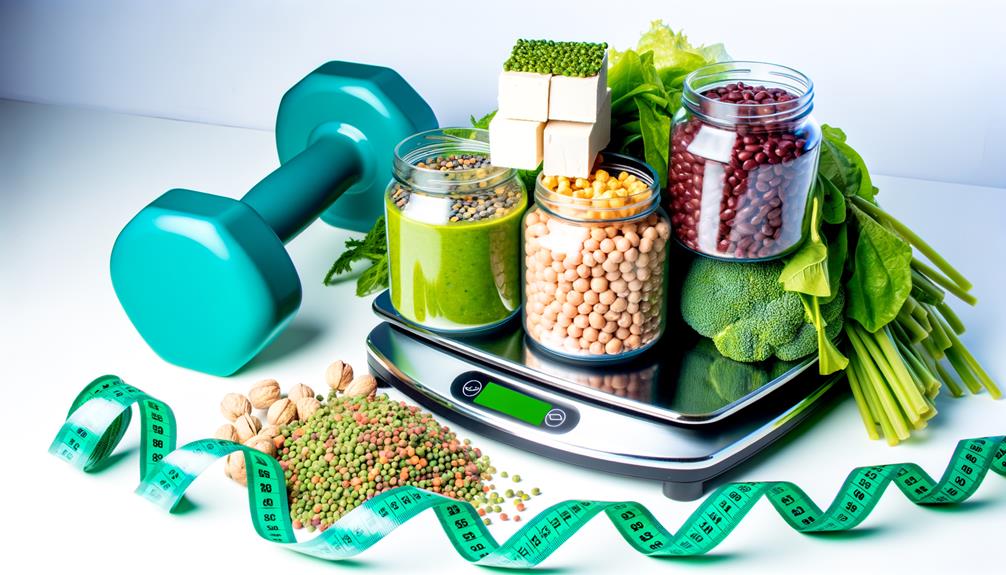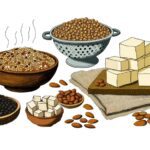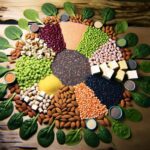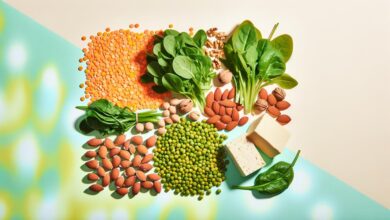In a world where juicy steaks are often hailed as the pinnacle of protein, you might be surprised to find an abundance of muscle-fueling options sprouting from the earth. As you navigate the path to weight loss, you'll find that the plant kingdom offers more than just salads; it's a realm where protein-rich sources abound, ready to satisfy your nutritional needs without weighing you down. Lentils, for instance, aren't just tiny legumes; they're a dense source of protein that can power your workouts and aid in recovery. And while quinoa is often lumped with grains, it's a complete protein champion that plays well in any meal plan. You've likely heard whispers of tofu's blandness, but with the right touch, it transforms into a culinary chameleon, adept at absorbing flavors while keeping your calorie count in check. Let's embark on a culinary journey that will not only challenge the conventional wisdom of protein but also support your weight loss goals with sustainable, cruelty-free choices. Stay with me as we uncover the powerhouses of plant-based protein that promise to fuel your body and tantalize your taste buds, one spoonful at a time.
Key Takeaways
- Lentils, quinoa, black beans, tofu, tempeh, seitan, chickpeas, and edamame are all effective vegan protein sources for weight loss.
- These protein sources are high in protein and fiber, which aid in weight management and promote a feeling of fullness.
- They are versatile and adaptable to various dishes, adding diversity to vegan meals.
- Incorporating these protein sources into a plant-based diet can support muscle repair and growth, as well as contribute to sustainable and compassionate choices for the planet.
Lentils: A Protein Powerhouse
Lentils, hailed as a protein powerhouse, offer a robust foundation for a plant-based diet that supports your weight loss journey. Their versatility is unmatched—whether you're concocting a hearty stew, whipping up a refreshing salad, or folding them into a wrap, lentils adapt to your culinary vision with grace. This humble legume doesn't just conform to various palates; it also packs a wealth of health benefits.
Rich in fiber, lentils promote a feeling of fullness, curbing your appetite and helping you resist the urge to indulge in less nutritious snacks. They're low in calories yet high in nutrition, making them an ideal choice for weight management. The protein they provide is crucial for muscle repair and growth, especially if you're incorporating exercise into your weight loss regime.
Lentils are more than just food; they're a gesture of care toward your body and a testament to the power of plant-based eating. By incorporating them into your meals, you're choosing a sustainable and compassionate path that not only serves your health goals but also the well-being of our planet. Embrace lentil versatility and revel in the health benefits they bring to your table.
Quinoa: More Than a Grain
While embracing the benefits of lentils in your diet, don't overlook quinoa, a seed that's often mistaken for a grain and stands tall as a nutritional champion in its own right. Quinoa's versatility makes it a perfect addition to your weight loss journey. You can create nourishing quinoa salads that are both filling and flavorful, without weighing you down. Often hailed as an "ancient grain," quinoa has sustained generations with its high protein content and essential amino acids.
Culturally, quinoa is deeply rooted in the Andean region, revered for its resilience and nutritional value. It's a testament to the wisdom of ancient peoples, who understood the importance of plant-based sustenance. By incorporating quinoa into your meals, you're not just benefiting your health but also partaking in a tradition that dates back thousands of years.
Here's a snapshot of quinoa's nutritional profile:
| Nutrient | Per 100g | Benefit |
|---|---|---|
| Protein | 14g | Supports muscle maintenance |
| Fiber | 7g | Aids in digestion and satiety |
| Iron | 4.6mg | Essential for healthy blood |
Quinoa's high fiber content complements its protein, making it a powerful ally in your quest for weight loss. It's a nourishing choice that serves your body's needs while honoring a legacy of plant-based nutrition.
Tofu: Versatile and Lean
Discover tofu, a soy-based powerhouse, that not only adds diversity to vegan meals but also assists in shedding unwanted pounds with its lean protein content. This unassuming bean curd has been a staple in Asian cuisine for centuries, and it's no wonder why—it's incredibly versatile and holds a deep cultural significance in plant-based diets. Tofu scramble, for instance, has become a go-to breakfast that nourishes the body with essential amino acids without the heaviness of traditional eggs.
The beauty of tofu lies in its soy versatility—whether it's grilled, baked, or sautéed, tofu absorbs flavors like a culinary chameleon, making it a delightful addition to any dish. When you're aiming to serve others, tofu's adaptability means it can easily cater to a variety of tastes and dietary preferences.
In your quest for weight management, incorporating tofu into your diet can be a game-changer. Its low-calorie yet high-protein composition supports muscle growth and repair without the excess calories that often accompany animal proteins. Embrace tofu's simplicity and let its understated richness transform your vegan meals into both a healthful choice and a gesture of care towards those you feed.
Tempeh: Nutrient-Rich Fermented Protein
Building on the lean protein foundation set by tofu, tempeh emerges as another formidable ally in your vegan weight loss journey, with its nutrient-dense profile and fermented goodness. Originating from Indonesia, this traditional soy product has gained worldwide acclaim, not just for its hearty texture, but for the tempeh benefits that come from its fermentation process.
Here's why you should consider tempeh as a staple:
- High in Protein: Tempeh is packed with plant-based protein, essential for muscle repair and satiety, helping you feel full longer.
- Fermentation Perks: The fermentation process breaks down phytic acid, enhancing nutrient absorption and making digestion easier on your body.
- Versatile Use: It can be marinated, grilled, or crumbled into dishes, adapting to a variety of recipes while contributing a rich, nutty flavor.
- Whole Food: Tempeh is a whole food; it retains all the soybean's fiber and phytonutrients, unlike other more processed protein options.
As a compassionate individual, you'll appreciate that tempeh, with its complex nutritional profile, not only serves your health goals but also aligns with a lifestyle dedicated to kindness and sustainability. Embrace the textured delight of tempeh to enrich your plant-based plates with cultural heritage and a punch of protein.
Black Beans: Fiber and Protein Combo
Dive into the world of black beans, where this humble legume serves as a powerhouse of both protein and fiber, supporting your weight loss journey with every nutritious bite. These small, shiny gems are a staple in many cultures, revered for their bean benefits that go beyond just weight management. They're rich in nutrients that can help stabilize blood sugar and promote satiety, two key factors in maintaining a healthy diet.
Black beans are not only good for you but also boast cooking versatility. You can incorporate them into various dishes, whether you're in the mood for a hearty chili, a refreshing salad, or a comforting soup. Their ability to absorb flavors makes them a fantastic canvas for your culinary creativity, all while you serve up kindness to your body and the planet.
Chickpeas: For Satiety and Strength
Just as black beans bolster your weight loss efforts, chickpeas stand out as another nutrient-dense legume, offering a satisfying blend of protein and fiber to help keep you strong and full for longer. They're not just a staple in plant-based diets for their versatility, but also because they offer a profound sense of satiety, vital for those moments when you're serving others but need to maintain your own energy levels.
Here's why chickpeas are a smart choice:
- High in Protein: Chickpeas provide essential amino acids that are crucial for muscle repair and body strength.
- Rich in Fiber: Their high fiber content helps regulate digestion, contributing to a feeling of fullness and aiding in weight management.
- Versatile in Cooking: From chickpea flour in gluten-free baking to myriad hummus recipes, there's no shortage of ways to incorporate them into your diet.
- Cultural Keystone: Revered in many cuisines, chickpeas have been nourishing communities for centuries, fitting seamlessly into a lifestyle focused on wellbeing and cultural respect.
With chickpeas in your pantry, you're equipped to create dishes that are not only nourishing but also help you stay aligned with your weight loss goals. Bring in the chickpea flour for a nutritious twist on traditional recipes or whip up a batch of hummus for a communal sharing that celebrates health and heritage.
Seitan: Wheat's Meaty Alternative
Seitan, often hailed as the plant kingdom's meaty marvel, provides a high-protein option for those looking to maintain a vegan diet without sacrificing the texture and richness of meat in their weight loss journey. Its Seitan versatility allows you to explore various culinary traditions, effortlessly adapting to flavors and cooking methods. You can grill it, stir-fry, or even use it as a base for vegan sausages.
However, you should be mindful of its Gluten content, especially if you're catering to those with gluten sensitivities. Seitan is essentially wheat gluten, the protein found in wheat, which gives it a dense and chewy texture, much like meat.
To help you understand what makes seitan a worthy contender in your diet, let's break down its nutritional profile:
| Nutrient | Benefit |
|---|---|
| High protein | Supports muscle maintenance |
| Low fat | Aids in weight loss |
| Iron | Essential for healthy blood |
| Selenium | Antioxidant properties |
Spirulina: Protein-Packed Superfood
While seitan offers a meaty texture and high protein content, spirulina presents an entirely different form of plant-based nutrition, packed with protein and a unique array of essential nutrients beneficial for those on a weight loss journey.
Spirulina, a blue-green algae, is not only a heavyweight in the protein department but also brimming with vitamins and minerals. It's a compassionate choice, aligning with a lifestyle dedicated to nourishing the body without harm to other beings. Embracing spirulina smoothies is a delightful and easy way to include this superfood in your diet.
Consider these algae advantages:
- High-Quality Protein: Spirulina contains about 60% protein by weight, which is essential for muscle repair and satiety, helping you stay full longer.
- Vitamins and Minerals: It's rich in B vitamins, iron, and manganese, supporting energy levels and overall health.
- Antioxidant Rich: With powerful antioxidants like phycocyanin, spirulina supports your body's defense against oxidative stress.
- Weight Management: Its high-nutrient, low-calorie profile makes it ideal for weight loss, as it provides nourishment while helping to manage calorie intake.
Incorporate spirulina into your meals with creativity and care, knowing you're serving your body a potent blend of nutrients that support your weight loss goals with every vibrant sip.
Frequently Asked Questions
How Does the Body's Absorption of Plant-Based Proteins Compare With That of Animal Proteins During Weight Loss?
You'll find plant-based proteins possess a different amino acid profile and protein bioavailability compared to animal proteins, which might affect your weight loss journey with a compassionate, community-serving approach.
Can Protein From Vegan Sources Cause Any Allergies or Intolerances That Might Affect Weight Loss Efforts?
You may encounter protein allergies or need intolerance management, impacting your weight goals. Embrace plant-based alternatives mindfully, always considering others' well-being as you navigate your health journey with authentic, compassionate choices.
Are There Any Specific Micronutrients That Are Commonly Deficient in a Vegan Diet Focused on Protein for Weight Loss, and How Can One Compensate for These?
You may find yourself lacking in certain micronutrients; monitoring and supplementation strategies are key. Consider a blood test to tailor your needs, ensuring a plant-based diet that's both nutritious and conducive to service.
How Do Vegan Protein Sources Impact Gut Health, and Does This Have Any Implications for Weight Management?
Vegan proteins can positively influence your gut microbiota, leading to healthy fermentation byproducts. This process supports a balanced digestive system, which is crucial for managing your weight and serving others through mindful eating.
What Are the Environmental Benefits of Choosing Vegan Protein Sources Over Animal Proteins When Trying to Lose Weight Sustainably?
Choosing vegan proteins, you're not just shedding pounds but also nurturing the planet. Sustainable agriculture blooms, and your carbon footprint withers, embodying a true steward of Earth's bounty and future.







